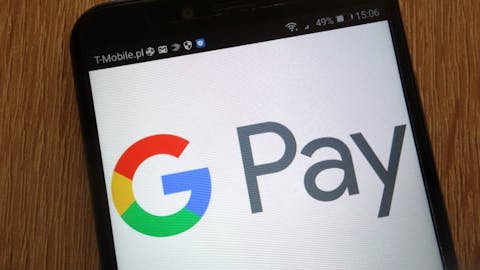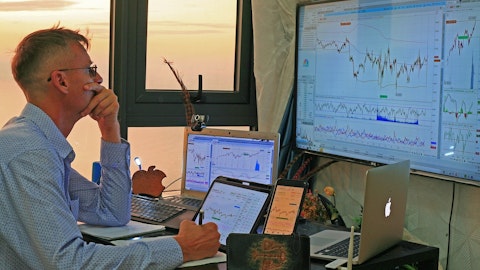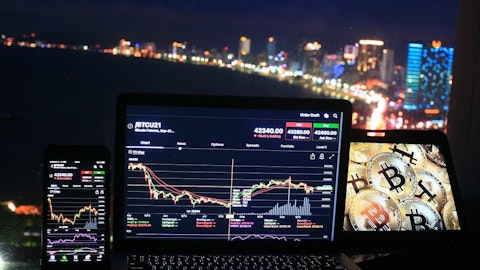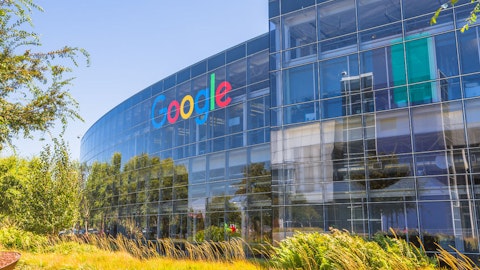Mayar Capital, an asset management firm, published its third-quarter 2022 investor letter – a copy of which can be downloaded here. For the three months ending September 30, 2022, the Mayar Responsible Global Equity Fund (Class A) was down -11.69% net of all expenses and fees, while the MSCI World Index declined by -6.19% in the same period. Try to spare some time to check the fund’s top 5 holdings for you to have an idea about their best stock picks this 2022.
In its Q3 2022 investor letter, Mayar Capital mentioned Alphabet Inc. (NASDAQ:GOOG) and explained its insights for the company. Founded in 2015, Alphabet Inc. (NASDAQ:GOOG) is a Mountain View, California-based multinational conglomerate company with a $1.1 trillion market capitalization. Alphabet Inc. (NASDAQ:GOOG) delivered a -38.55% return since the beginning of the year, while its 12-month returns are down by -40.43%. The stock closed at $88.91 per share on November 08, 2022.
Here is what Mayar Capital has to say about Alphabet Inc. (NASDAQ:GOOG) in its Q3 2022 investor letter:
“In early January this year – which admittedly feels like eons ago – US President Joe Biden was pushing Americans to take up the government’s offer of free COVID tests to help tackle the surging omicron variant. How did Biden respond when citizens asked about the availability of these tests?
“Google it!”
This advice, undoubtedly well-meant, was roundly scoffed at by the press, however. It seemed too obvious to be very helpful.
Anyway, the anecdote serves to introduce you to one of our largest holdings, Alphabet; the parent company of Google. Note that first, Alphabet’s original and core product – its search engine – has entered our common vocabulary as a verb. ‘Googling’ something has the same meaning as ‘researching’ or ‘finding an answer to’ something. Second the reason Biden’s advice was met with such opprobrium was because Googling something has become almost second nature to us now.
These two observations reveal a lot about Google’s strength in the search engine market, in which it has a share of over 90 percent. Because internet search is almost the prototypical network, Google has benefitted from – and we think is also protected by – the huge competitive advantage its scale brings – both to those asking the questions and those providing the answers. The Google search platform becomes increasingly useful to anyone seeking information as a greater volume of stuff becomes available. This starts a virtuous cycle that results in a colossal market share for Google itself. In the language of business strategists, Google benefits from vast network effects.
Because Google’s search results are viewed by billions of eyeballs every day, its search page ‘real estate’ is understandably very valuable to those with goods and services to sell. Advertising revenues from this ‘real estate’ as well as that from its other properties such as Mail, Maps, and so on, totaled almost USD 150b in 2021; amounting to almost 58% of the company’s revenues. Ad sales on YouTube, also owned by Alphabet, brought in another USD 28b. With the secular shift of the advertising spend to digital channels – over which Alphabet has a tight grip – we estimate the company has a share of around 40% of the digital advertising market and is probably the most valuable advertising property in the world…” (Click here to see the full text)

Our calculations show that Alphabet Inc. (NASDAQ:GOOG) ranks 6th on our list of the 30 Most Popular Stocks Among Hedge Funds. Alphabet Inc. (NASDAQ:GOOG) was in 153 hedge fund portfolios at the end of the second quarter of 2022, compared to 160 funds in the previous quarter. Alphabet Inc. (NASDAQ:GOOG) delivered a -24.33% return in the past 3 months.
In November 2022, we also shared another hedge fund’s views on Alphabet Inc. (NASDAQ:GOOG) in another article. You can find other investor letters from hedge funds and prominent investors on our hedge fund investor letters 2022 Q3 page.
Suggested Articles:
- 10 Best RV Stocks To Buy
- 16 Biggest Banks In the World
- 11 Best Consumer Cyclical Dividend Stocks To Buy
Disclosure: None. This article is originally published at Insider Monkey.





